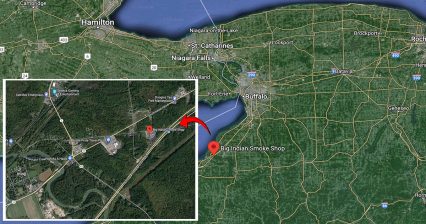Man Builds His Own Exit Off Highway To Get His Business More Traffic

Taking Matters Into His Own Hands: A Man’s Unconventional Solution to Boosting Business Traffic
Eric White, the proprietor of the Big Indian Smoke Shop in Irving, New York, has embarked on an unconventional endeavor to bolster traffic to his business. Instead of resorting to traditional marketing tactics or enhancing signage, he has taken a bold step by constructing his own off-ramp directly from the highway to his establishment. This audacious move, however, is not merely a bid to attract more customers but is also rooted in a personal protest following a legal dispute with the state of New York over allegations of selling untaxed cigarettes. In this article, we delve into the intricacies of White’s actions, the legal implications surrounding his endeavor, and the broader implications for the community and future construction endeavors.
The Genesis of a Controversial Project
Eric White’s decision to construct an off-ramp leading to his smoke shop stems from a desire to address the challenge of driving traffic to his business, Dissatisfied with conventional methods of advertising and branding, White opted for a more direct approach: carving out his own pathway from the highway to his storefront. However, his motivations extend beyond mere business interests. According to reports by WRAL, White views this construction project as a form of personal protest in response to a legal battle with the state of New York.

A Legal Battle Unfolds
The crux of White’s legal dispute with the state revolves around allegations of selling untaxed cigarettes. In the eyes of White and his legal counsel, the state lacks a valid easement over sovereign territory, thereby empowering him to undertake construction activities on his property as he sees fit. By erecting an off-ramp without state approval, White asserts his autonomy and challenges the jurisdictional authority of state entities over tribal land.
Navigating Legal Grey Areas
As the situation unfolds, legal experts and authorities grapple with the complexities of jurisdiction and regulatory oversight. The Federal Highway Administration, tasked with overseeing interstate infrastructure projects, finds itself in uncharted territory. While the agency typically mandates approval for the construction of new ramps, the unique status of tribal land introduces a layer of ambiguity. Determining the applicability of federal regulations to this particular scenario poses a significant challenge, raising questions about the extent of governmental authority and tribal sovereignty.
Community Response and Implications
Despite the legal uncertainties surrounding White’s off-ramp construction, the local community has expressed mixed reactions to his initiative. Some residents view the off-ramp as a welcome convenience, facilitating easier access to the smoke shop and potentially driving economic activity in the area. However, concerns have been raised regarding the precedent set by White’s actions and the implications for future construction endeavors.

The Ethics of Rogue Construction
White’s decision to circumvent traditional channels of approval and oversight raises ethical questions about the boundaries of individual agency and corporate responsibility. While his actions may be driven by legitimate grievances and entrepreneurial ambitions, they also pose challenges to established norms of regulatory compliance and community governance. As stakeholders weigh the implications of White’s rogue construction project, they confront broader issues of accountability, transparency, and the balance of power between individuals and regulatory bodies.
Conclusion: Navigating Uncharted Terrain
The case of Eric White’s off-ramp construction project serves as a microcosm of larger debates surrounding jurisdictional authority, tribal sovereignty, and individual autonomy. As legal proceedings unfold and community dynamics evolve, stakeholders must navigate uncharted terrain, grappling with complex legal, ethical, and practical considerations. Whether White’s off-ramp ultimately stands as a testament to entrepreneurial ingenuity or a cautionary tale of regulatory defiance remains to be seen. In the interim, his actions provoke reflection on the nature of power, governance, and the pursuit of economic opportunity in an increasingly interconnected world.

